Revisiting Butler: The Day We Can't Forget
There continue to be too many unanswered questions about July 13 in Butler. A new book seeks to address that. We consider three scenarios over who was behind the attempt to murder President Trump.
One of the worst things about the frenetic news cycle we live in is that important stories worth digging into and fleshing out get quickly buried, as we all move on to the next flavor of the month. Nowhere is that truer than the events of July 13 in Butler, Pennsylvania, and the attempt to assassinate Donald Trump—and, really, for the entire nine-day period that followed, culminating in the forced removal of Joe Biden from the presidential race.
Revisiting and analyzing those events is what makes the book Bulletproof, by Jack Posobiec and Joshual Lisec, so important. A nice hardcover book, it’s a great stocking stuffer for the political person in your life this Christmas. And revisiting what happened in Butler, what it’s implications and long-term consequences are, will be our purpose here.
What Happened
You all know the basics of what happened, but can we spell it out? Whomever was behind this assassination attempt wanted a lot more than just to eliminate Donald Trump. They wanted to send a message to the entire movement that was behind him—a movement that, as it turned out, would be large enough to constitute a popular vote win.
Trump’s speech in Butler was on national television, shown by Fox. The shot fired by would-be assassin Thomas Crooks was aimed at the head. Therefore, the goal of the perpetrators was nothing less to see Trump’s head explode like a watermelon on national television, in front of his strongest supporters, and likely in front of lot of kids who may have been watching.
This is how close we came to such a horrific scene:
I’m spelling that out, because I think it’s worth remembering every time we hear people bemoan the fact that a now-victorious Trump may use the Justice Department to “go after” his enemies or generally lament whatever they see as Trump’s personal shortcomings. Those same people were perfectly fine with just moving on from Butler—maybe not condoning it, but certainly not demanding answers.
THREE POSSIBLE NARRATIVES
Who were the perpetrators? Posobiec and Lisec lay out three possible scenarios and explore the evidence (or lack thereof) behind each one:
A Series of Unfortunate Events
This is the narrative pushed by corporate media. It takes the Secret Service to task for an array of security failures—starting with non-responsiveness to requests by the Trump team for additional manpower, to diverting the most talented agents to Jill Biden’s event that night in nearby Pittsburgh, to the failure to deal with a drone that surveyed the area prior to Trump’s rally, to the failure to secure the roof where Crooks positioned himself (the only place where he could have a line of sight to take the shot), to failing to respond to multiple crowd members pointing Crooks out well in advance of the shooting.
And what of Crooks himself? He was a 20-year-old with marginal political activity that gives a conflicting portrait. On the one hand, he made a modest donation to Act Blue, a Democratic fundraising group. On the other hand, he had registered as a Republican. We don’t know more than that because Crooks had no social media presence where he could air his opinions.
Thus, if you consider this scenario the most plausible, you believe that a college-age student who shunned social media (because that’s so common these days) still had political opinions strong enough that he would actively seek to murder a former and potentially future president. And that this student just happened to be lucky enough to pick a day on which a sequence of catastrophic security errors would happen.
That’s what the corporate media proposes for your belief. Conservatives who, in the immediate aftermath, began fuming about ‘DEI hiring for the Secret Service” (a response to a short woman being the one who had to shield Trump) gave credence to this theory—perhaps unwittingly—by tacitly conceding the point that Secret Service incompetence was the root cause of the assassination attempt.
As you may have deduced, I find this a little too much to accept. While one should never rule out government’s ability to screw things up, this is an incredible amount of failings—any one of which, individually, would be suspicious. Collectively, it’s too much to accept. Particularly when it fails to answer the question of why Crooks just happened to choose this day as the one where he would show up and take a shot at Trump. Or what Crooks’ motive was in the first place.
This doesn’t mean everyone on Secret Service detail in Butler that day was “in on it.” Or even most of them. Any number of scenarios are plausible, but they all presume some degree behind-the-scenes orchestration.
Which leads us to the corporate media’s backup story…
Iran Was Behind It
On the surface, this is reasonable. The hostile relationship between the United States and Iran goes back to the hostage crisis that ruined Jimmy Carter’s presidency in the late 1970s. Trump himself has been hard on Iran. The sanctions he applied during his first term left the regime in Tehran starving for cash. Trump cites Biden’s lifting of these sanctions as the cause of Iran getting the cash flow necessary to bankroll the brutal attack on Israel on October 7, 2023. Trump is likely using the prospect of resuming an economic crackdown on Iran as a means of getting Israel to call off the dogs in Gaza and restore peace in the Middle East.
All of which is to say that Iran has plenty of motive. But that still leaves unanswered questions.
For one, let’s start with the timing of the assassination attempt. It was two days prior to the Republican Convention, meaning that Trump was not yet officially the GOP nominee. Had Crooks’ bullet found its mark, who would have taken Trump’s place? I don’t know exactly how it would have played out, but the default favorite would have been Nikki Haley, the second-leading vote-getter in the Republican primaries.
Haley ran her entire campaign basically promising a restoration of the Republican War Hawks, who have been sidelined by Trump’s America First movement. Haley visited Israel and actually wrote the words “Finish them” on missiles the Israeli army was using. A little psychotic if you ask me, but it underscores the point that while Trump is applying severe economic pressure to Iran, Haley was far more likely to seek a military solution.
Moreover, one of the other suspicious non-activities that took place in the aftermath of July 13, was the complete disinterest of the Republican-controlled House doing a serious investigation of Butler. They did a couple days of hearings, put on some performative displays of emotion, and then left town for summer vacation.
That’s a lot of disinterest in finding out why your own party’s nominee was nearly murdered. And it’s even more suspicious given that GOP officeholders (in sharp contrast to the party’s actual voters) tend to share Haley’s hawkish views generally and on Iran specifically. If Iran really were behind it, wouldn’t a GOP-led House have led the charge, with nationally televised hearings throughout the late summer and early fall, building the case against Tehran?
Iran is also the one global hotspot where Trump is vulnerable to being talked out of his non-intervention instincts. Yet, the D.C. officials most likely to try and influence in him in that direction showed no interest in hearings that might have served their purpose.
Thus, to believe Iran is behind it, you have to believe that they acted in a way contrary to their own interests, and that those domestic political actors with the most to gain from exposing Iran were disinterested in doing so—starting with a failure to find any connection between Crooks and Iran.
It’s not completely implausible. Governments do stupid things against their own interests every day. Politicians in charge of investigations are more than capable of just being lazy. But it still takes an awful lot of leaps to accept Iran as the culprit—particularly when we would still need to know why all of the aforementioned security failings at Butler took place.
Which leads us to…
The Inside Job
Under this theory, the security failings and incompetence of Butler were not really failings and incompetence at all. They were precisely carried out to give Thomas Crooks a clean shot at Trump. Even if you subscribe the Iran theory, you still have to accept that there was some level of inside help needed to create the conditions possible for Crooks to take his shot.
In support of this theory, we start with the timing. By July 13, it was apparent that the attempts to deal with Trump through abuse of the legal system was failing. Cases were falling apart. The one case where they had gotten a conviction in New York City was a transparent joke—turning a bookkeeping dispute into 34 felonies—and the public knew it. Trump was ahead in the polls. And with Joe Biden coming off an all-time disastrous debate performance a little over two weeks earlier, this campaign was on the verge of being over.
Thus, media hoaxes and smear campaigns had failed. Lawfare had failed. If you wanted to stop Trump at any cost, there was only one card left to play. The series of “failings and incompetence,” paved the way for Crooks to get a clear line of sight and take his shot followed.
It won’t surprise you by this point to know this is the theory I subscribe to. It has fewer holes and fewer improbable leaps of faith required than the other two. It does, however, leave more questions than answers.
The phrase “inside job” is broad. Who was pulling the strings? There are a lot of potential beneficiaries to Trump’s death. Here’s just a short list:
*A desperate Biden White House stood to benefit from a Republican Party that would have been throw into chaos. This would explain the repeated denial of security requests from the Trump campaign and the convenient shifting of experienced personnel to be at Jill’s event rather than Butler.
*A Republican Establishment, routed at the ballot box in the primary, could have seen Haley ascend to the throne and capitalize on Biden’s mental infirmities, something that could no longer be denied after his disastrous debate performance. This would explain the disinterest of that Establishment in investigating the assassination, even though they had the levers of power in the U.S. House of Representatives.
*The Military-Industrial Complex stood to be the big winner of a Haley vs. Biden (or Harris) general election matchup, with both candidates arguing for more intervention abroad.
*The Donor Class, who enjoys being able to control candidates on both sides of the aisle with the fact that the donors are necessary for any presidential candidate who wants enough visibility and funding to win a national election. With one notable exception. While Trump does rely on the donors to a certain extent, his wealth and pre-political fame, make him someone they can’t control.
Those are just a few possible suggestions. I’m sure they are others. All of them are admittedly vague. We need more investigation to flesh them out. As alluded to already, the lack of investigation is itself a piece of evidence that supports the “Inside Job” theory. No one seems in any hurry to find out exactly who’s behind this.
The Aftermath
Trump’s survival at Butler has already changed the course of history. Consider what has happened since the moment he rose from behind the podium with his fist in the air.
*Within 48 hours, he had tapped J.D. Vance—the most anti-Establishment Republican in the U.S. Senate—to be his running mate.
*That next week, Trump was on the phone with Robert F. Kennedy Jr. By August 23, Trump and RFK had forged a historic anti-Establishment bipartisan alliance.
*The support of RFK was followed by the support of other Democrats, who lamented the loss of their party’s anti-war tradition, most notably Tulsi Gabbard, who found herself, as Trump does, labeled a “Russian asset” for being skeptical of military intervention.
*Since winning the election, Trump has made a series of nominations that promise to deliver body blows to the governing Establishment—Tulsi as Director of National Intelligence (DNI), RFK at Health and Human Services (HHS), where he will oversee the FDA and its corrupted relationship with Big Pharma, and most recently, Kash Patel to run the FBI.
Trump has been circumspect in his words regarding who he thinks was behind the attempt to murder him for a live television audience. But if the actions of men are the best interpreters of their thoughts, it’s surely worth noting that his anti-Establishment focus has drastically accelerated since July 13 in Butler. Whereas, in a post-election interview, he explicitly ruled out getting involved in any “regime change” effort in Iran. All of this suggests Trump leans to the “Inside Job” theory.
We’ll find out. When Vance was interviewed by Joe Rogan, the VP-Elect said that we have to get to the bottom of what happened in Butler. So, it doesn’t sound like the incoming Administration is ready to memory-hole what happened on July 13. Neither should we. Because there were martyrs in Butler that day.

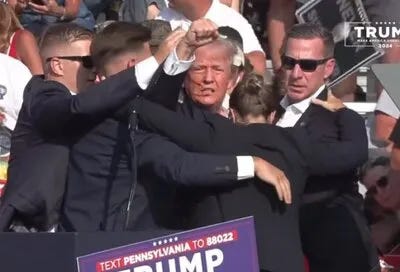




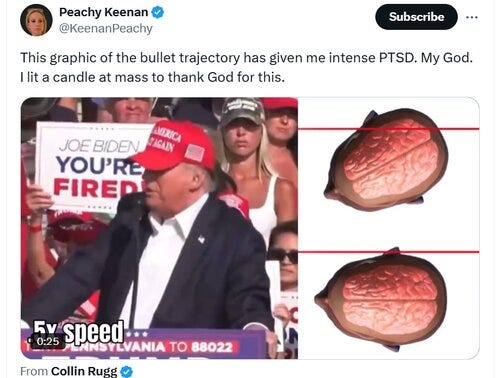
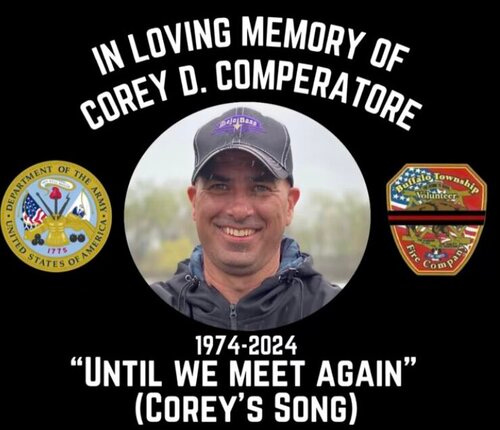
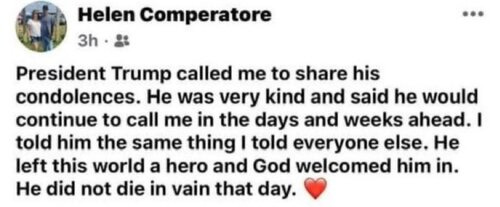
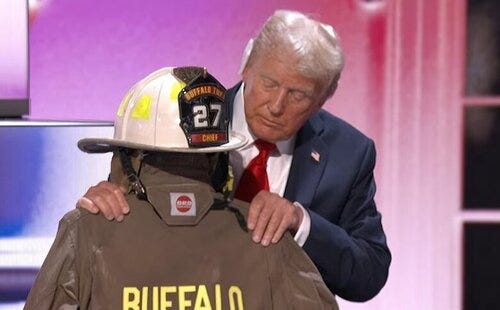
Nice Article Dan! I save all of them, but I get so darn busy. I have them though...